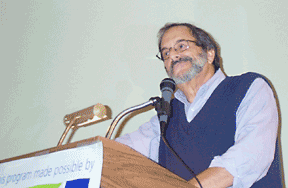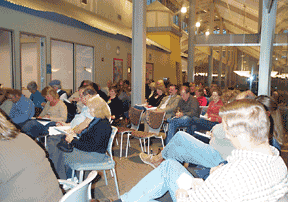 |
|||||||||||
|
|||||||||||
|
|||||||||||
You May Not Know It, But You’re a PoetMaryland’s Laureate rhymes the coupletby Margaret TearmanBay Weekly Staff writer
Michael Glaser is no hothouse poet. He’s a prize fighter of a poet. He comes out punching, hits you in the stomach, knocks you over with the simplicity and accuracy of his words. He takes poetry out of the schoolbooks and turns the stories of daily life into poems. That’s what awed those gathered at Poet Laureate Glaser’s poetry encounter at the new Calvert Prince Frederick library. In officially dedicated Poetry Month, Glaser made it easy to think about — and in — poetry at his lively appearance at the library’s regular Poets Corner, meeting every third Thursday. Listeners circled Maryland’s Poet Laureate as if around a storyteller at a campfire until, overflowing the room, the gathering five dozen strong was forced into the hall. They’d come for poetry, but Glaser connected them back into everyday life. As he spoke, the fact of life weighing every mind was the massacre at Virginia Tech. Glaser talked about the shooter, an English major, with an empathy that isn’t surprising in a good teacher. Glaser borrowed Thomas Merton — a mid-century Catholic monk, mystic and pacifist — to explain how poetry can help us cope with everyday life, even its violence. “The rush and pressure of modern life are a form, perhaps the most common form of innate violence,” Merton wrote. “The frenzy of the activist neutralizes his work for peace.” Those words had been in his notebook for 15 years, Glaser said. He understood their meaning only after the massacre, when students straggling in late raised his ire. As the last student appeared, he boiled over. “I wanted to share my understanding with these students, and they weren’t there, so I got mad,” he told his Calvert listeners. “The frenzy of the activist neutralizes his work for peace. My god, this is me.” From this is me, Glaser asked his listeners who are you? In a “quick and dirty” lesson in creative writing, he taught how to use words the way a poet does to interpret daily life. In silences from three to six minutes, he assigned writing exercises. First, he asked for a personal ad that would express “what you’re looking for and what you want to know about the other if you were to live in the center of your being where most important passions lie.” Later, he suggested a poem to grow from this stem: “This is a poem about blank and how blank and why blank and what this poem most wants to say is blank.” Some picked up their pens; others sat meditatively. When, 90 minutes in, it was time for listeners to become readers, daily lives overflowed from thoughts into words. One poet returned to Blacksburg, putting her horror, sadness and her confusion into a poem. The routines and rituals of daily lives wanted their say as well. Opening a private door, Glaser compared the kind of father and husband he hoped to be to the one he thought he had become. Balancing humor and caution, he instructed his daughters to memorize a poem by Hafez. “I love it because it reminds me what kind of husband I want to be,” Glaser said. Even after all this time the sun never says to the earth you owe me. Look what happens with a love like that. It lights the whole sky.
“I tell my girls when you’re on a date and a guy is sitting in the car with you, say this to him: ‘the sun never says to the earth you owe me — take your hands off me — look what happens with a love like that.’ When the poets in the audience took their turns at ordinary life, another man who didn’t look the part stood to read his poem about gravity and baseballs. Another poem completed Glaser’s assigned personal: “Well built, good foundation.” Since poetry is about what we do 24 hours of seven days of 52 weeks of our lives, Glaser encouraged would-be writers to move their lives into words. His lesson borrowed the words of William Stafford, who Glaser called “a great American writer I urge you to read”: Talk with a little luck in it, that’s what a poem is. Put the words on a page and let them go where they want. Sister Maryland poet Lucille Clifton, he said, would change the advice a little: Put words on the page and get out of their way. Glaser welcomed his poetry students to a library as a “place of quietness, stillness … a place to combat craziness.” But on this Thursday evening, the library wasn’t so still. Families passed through Glaser’s magic circle on their way to the children’s reading room. The elevator chimed. Laughter floated up from a lively book sale a floor below. But it remained a place to “combat craziness.” Besides, as listener Ellen McCormack said, “There isn’t anything else to do in Calvert on a Thursday night but come to the library.” Or make poetry. |
|||||||||||
|
|||||||||||
|
|
|||||||||||
|
© COPYRIGHT 2007 by New Bay Enterprises, Inc. All rights reserved. |
|||||||||||


